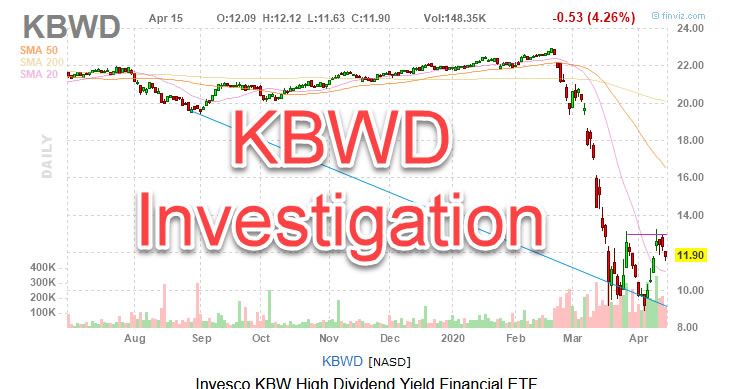The Haselkorn & Thibaut, P.A. law firm is investigating potential sales practice violations by financial advisors who were recommending Invesco KBW High Dividend Yield Financial ETF (NASDAQ: KBWD) and related high dividend type investments sold to investors.
The recent trading in KBWY has been in the $12.50/share range. Looking back KBWY was trading in general over $20.00/share in the second half of 2016, through 2017, 2018, 2019 and continued on that trend into February 2020. The year-to-date total return is -35% or worse for investors.
Invesco KBW High Dividend Yield Financial ETF (KBWD) seeks to track the KBW Nasdaq Financial Sector Dividend Yield Index (the “underlying index”). The fund generally will invest at least 90% of its total assets in the securities that comprise the underlying index. The underlying index is a modified-dividend yield-weighted index of companies principally engaged in the business of providing financial services and products, as determined by the index provider.
NOTICE TO INVESTORS IN KBWD
Table of Contents
The Haselkorn & Thibaut, P.A. law firm is a nationwide investor law firm (www.investmentfraudlawyers.com) investigating potential sales practice violations by financial advisors who were recommending KBWD and many similar “high dividend or high yield” investments sold to investors.
For investors, this is a particularly tough blow as these are the types of investments that were often recommended by financial advisors to clients who were looking for income in their portfolios (often retirees or similarly conservative investors). This was likely a recommendation that was expected to be low volatility and fairly conservative, now investors are faced with substantial losses as a result of a level of risk to their original investment principal that was probably never properly disclosed (if it was ever disclosed at all) by their financial advisors.
As some strategies are leveraged in the hopes of increasing potential returns, they also increased the level of risk, and some investors may not have been advised of those potential risks as well. Although Financial advisors may claim that these were unforeseen market events, the reality is that these are similar risks to those experienced in the 2008-2009 financial crisis. These potential risks were material risks that should have been properly disclosed to clients before recommending these investments individually or as part of a portfolio or investment strategy.
Many of these investments were sold by financial advisors without proper risk disclosures, as these are considered very risky and complex (some even speculative because of the leverage) securities. In cases where these were recommended to retirees or similar conservative income-seeking investors there is the potential for sales practice abuse as a result of misrepresentations, but more often as a result of omissions of material fact, or due to a lack of proper supervision.
Investors Seeking to Recover KBWD Losses
For some investors, a private FINRA arbitration customer dispute enables them to bring a claim and potentially recoup their KBWD investment losses. These customer disputes typically involve only paper discovery and no depositions, and they are generally faster and more efficient compared to traditional court litigation, as they provide a private forum to resolve disputes more quickly and efficiently.
About Haselkorn & Thibaut, P.A.
Haselkorn and Thibaut, P.A. is a nationwide law firm specializing in handling investment fraud and securities arbitration cases. The law firm has offices in Palm Beach, Florida, on Park Avenue in New York, as well as in Phoenix, Arizona and Cary, North Carolina. The two founding partners have nearly 45 years of legal experience.
Haselkorn & Thibaut, P.A. has filed numerous (private arbitration) customer disputes with the Financial Industry Regulatory Association (FINRA) for customers who suffered investment losses relating to issues similar to those matters mentioned above. There are typically no depositions involved, and those cases are typically handled on contingency with no recovery, no fee terms.


